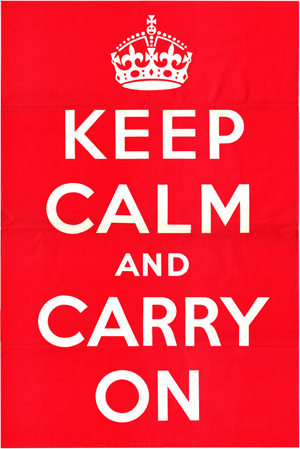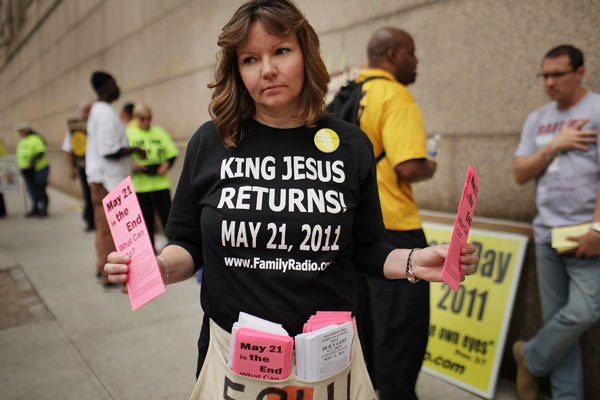 We love stories of dystopian futures, apocalyptic prophecies and nightmarish visions here at theDiagonal. For some of our favorite articles on the end of days, check out end of world predictions, and how the world may end.
We love stories of dystopian futures, apocalyptic prophecies and nightmarish visions here at theDiagonal. For some of our favorite articles on the end of days, check out end of world predictions, and how the world may end.
The next impending catastrophe is due a mere week from now, on December 21st, 2012, according to Mayan-watchers. So, of course, it’s time to make final preparations for the end of the world, again. Not to be outdone by the Mayans, the British, guardians of that very stiff-upper-lip, have some timely advice for doomsayers and doomsday aficionados. After all, only the British could come up with a propaganda poster during the second World War emblazoned with “Keep Calm and Carry On”. While there is some very practical advice, such as “leave extra time for journeys”, we find fault with the British authorities for not suggesting “take time to make a good, strong cup of tea”.
[div class=attrib]From the Independent:[end-div]
With the world edging ever closer to what some believe could be an end of days catastrophe that will see the planet and its inhabitants destroyed, British authorities have been issuing tongue in cheek advice on how to prepare.
The advice comes just two weeks ahead of the day that some believe will mark the end of world.
According to some interpretations of the ancient Mayan calendar the 21st of December will signal the end of a 5,125-year cycle known as the Long Count – and will bring about the apocalypse.
There have been scattered reports of panic buying of candles and essentials in China and Russia. There has also been a reported hike in the sales of survival shelters in America.
An official US government blog was published last week saying it was “just rumours” and insisting that “the world will not end on December 21, 2012, or any day in 2012”.
In France, authorities have even taken steps to prevent access to Bugarach mountain, which is thought by some to be a sacred place that will protect them from the end of the world.
Reports claimed websites in the US were selling tickets to access the mountain on the 21st.
In the UK, however, the impending apocalypse is being treated with dead-pan humour by some organisations.
The AA has advised: “Before heading off, take time to do the basic checks on your car and allow extra time for your journey.
“Local radio is a good source of traffic and weather updates and for any warnings of an impending apocalypse. Should the announcer break such solemn news, try to remain focused on the road ahead and keep your hands on the wheel.”
A London Fire Brigade spokesman issued the following advice: “Fit a smoke alarm on each level of your home, then at least you might stand a chance of knowing that the end of the world is nigh ahead of those who don’t.
“If you survive the apocalypse you’ll be alerted to a fire more quickly should one ever break out.”
An RSPCA [Royal Society for the Prevention of Cruelty to Animals] spokesman offered advice for animal lovers ahead of apocalypse saying: “Luckily for animals, they do not have the same fears of the future – or its imminent destruction – as us humans, so it is unlikely that our pets will be worrying about the end of the world.
[div class=attrib]Read the entire article after the jump.[end-div]
[div class=attrib]Image: Digital scan of original KEEP CALM AND CARRY ON poster owned by wartimeposters.co.uk.. Courtesy of Wikipedia.[end-div]

 [div class=attrib]From Slate:[end-div]
[div class=attrib]From Slate:[end-div]